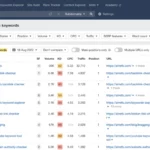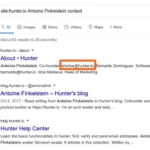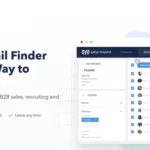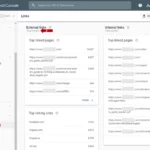Editorial links are organic links that are earned naturally when other websites find your content valuable and link to it. On the other hand, guest blogging links are acquired through a collaborative effort with another website, where you contribute a guest post in exchange for a link back to your site.
Why are Links Important?

Links play a crucial role in the success of a website for several reasons. Firstly, search engine ranking is heavily influenced by the number and quality of links pointing to a website. Search engines like Google consider links as votes of confidence from other websites, indicating that your content is valuable and trustworthy. Websites with a higher number of quality links tend to rank higher in search engine results, leading to increased visibility and organic traffic. Additionally, referral traffic is another significant benefit of having links. When other websites link to your content, it exposes your website to a new audience, potentially driving targeted traffic to your site. This can result in an increase in leads, conversions, and overall brand exposure. Building a strong network of links is essential for improving search engine rankings and driving valuable referral traffic to your website. So, let’s explore the various types of links to look for and the methods to find them.
1. Search Engine Ranking
One of the main reasons why links are important is their impact on search engine ranking. When search engines like Google crawl websites, they analyze the quantity and quality of links pointing to a specific site. These links act as a vote of confidence, indicating to search engines that the website is reputable and trustworthy. Search engine ranking is heavily influenced by the number and quality of links a website has. Websites with a higher number of authoritative and relevant links tend to rank higher in search engine results pages (SERPs). This increased visibility can lead to more organic traffic, as users are more likely to click on websites that appear higher in the search results. Having a strong link profile is essential for improving search engine ranking and increasing the chances of your website being discovered by potential visitors. So, it’s important to focus on building high-quality links from reputable sources. For more information on how to improve your website’s search engine ranking, check out our article on how to find the index of a website.
2. Referral Traffic
Referral traffic is a significant benefit of having links to your website. When other websites link to your content, it creates an opportunity for their audience to discover and visit your site. This referral traffic is highly valuable because it comes from users who are already interested in the topic or niche that your website covers. For example, if you have a blog post about “how to get traffic on YouTube,” and a popular YouTube marketing website links to your post, their audience may click on the link to learn more. This not only exposes your website to a new audience but also increases the chances of generating leads, conversions, and even potential collaborations. By building a strong network of links, you can tap into the power of referral traffic and expand your website’s reach. So, let’s explore the different methods to find and build links to your website, and harness the benefits of referral traffic.
Types of Links to Look For

When it comes to finding links for your website, there are several types you should look for. One type is editorial links, which are natural links that are voluntarily placed by other website owners or editors who find your content informative and valuable. These links are highly regarded by search engines because they indicate that your content is trustworthy and relevant. Another type of link to consider is guest blogging links. Guest blogging involves writing and publishing articles on other websites in exchange for a link back to your own site. This not only helps to establish your authority and expertise in your industry but also provides an opportunity to reach a wider audience. Lastly, broken link building is another effective strategy. This involves finding broken links on other websites and reaching out to the website owner to suggest replacing the broken link with a link to your relevant content. This mutually beneficial approach helps website owners fix their broken links while gaining a valuable backlink for your own site. By actively seeking out and obtaining these different types of links, you can enhance your website’s visibility, authority, and ultimately drive more traffic to your site.
1. Editorial Links
Editorial links are links that are naturally earned through the creation of high-quality content. These links are given by other websites voluntarily, without any form of payment or exchange. They are considered valuable because they indicate that other websites find your content informative, useful, or authoritative. Editorial links are often the most desirable type of link because they typically come from reputable sources and carry more weight in terms of search engine rankings. These links are usually embedded within the body of an article or blog post, providing additional information or resources to the readers. The best way to attract editorial links is to consistently produce valuable and shareable content that others would naturally want to link to. This can be achieved by conducting in-depth research, providing unique insights or perspectives, and offering practical solutions to common problems. By focusing on creating high-quality content, you increase the chances of earning editorial links from other websites, which can significantly boost your website’s visibility and authority in search engine rankings. So, make sure to prioritize the creation of exceptional content to attract valuable editorial links.
2. Guest Blogging Links
Guest blogging is a popular and effective strategy for building links to your website. With guest blogging links, you have the opportunity to contribute valuable content to other websites in your niche, while also including a link back to your own website. This not only helps to establish your authority and expertise in the industry but also provides an avenue for attracting referral traffic from the websites you contribute to. When searching for guest blogging opportunities, look for websites that are relevant to your niche and have a strong readership. Reach out to the website owners or editors with a pitch for an article that you can contribute. Make sure to focus on providing high-quality, informative content that will be valuable to their audience. By regularly guest blogging on reputable websites, you can build a strong network of backlinks and increase your website’s visibility and authority in the eyes of search engines. So, start exploring guest blogging opportunities and harness the power of guest blogging links to boost your website’s link profile and drive targeted traffic.
3. Broken Link Building
Broken link building is a powerful strategy for acquiring valuable backlinks to your website. When a website has broken or dead links, it means that the page it was linking to no longer exists or has been moved. This presents an opportunity for you to reach out to the website owner and suggest replacing the broken link with a link to your relevant and high-quality content. By doing so, you not only help the website owner fix their broken link issue but also gain a valuable backlink for your own website. To find broken link building opportunities, you can use backlink analysis tools that crawl websites and identify broken links. Once you have identified relevant websites with broken links, you can reach out to the website owner and inform them about the broken link on their site. Politely suggest your content as a replacement, highlighting its relevance and value. This approach not only helps you build links but also provides a solution to a problem the website owner may not be aware of. By focusing on broken link building, you can acquire high-quality backlinks that can significantly improve your website’s visibility and authority in search engine rankings.
To learn more about how to find keywords for affiliate marketing, check out our comprehensive guide on how to find keywords for affiliate marketing.
Methods to Find Links

When it comes to finding links to your website, there are various methods that you can employ. These methods include:
1. Competitor Analysis: Analyzing your competitors’ backlink profiles can give you valuable insights into potential link opportunities. Identify websites that are linking to your competitors and reach out to them to see if they would be interested in linking to your website as well.
2. Backlink Analysis Tools: Utilize backlink analysis tools like Ahrefs or Moz to identify the websites that are linking to your competitors or industry influencers. These tools provide comprehensive data on the quality and quantity of backlinks, allowing you to identify potential link-building prospects.
3. Online Directories: Submitting your website to relevant online directories can help you acquire valuable links. Look for directories that are specific to your industry or niche and ensure that they have a good reputation and high domain authority.
4. Guest Blogging Platforms: Guest blogging is a popular method to build links. Look for reputable guest blogging platforms that accept guest posts in your industry. By contributing high-quality content to these platforms, you can earn links back to your website.
5. Social Media Platforms: Social media platforms can be a great source of links. Engage with relevant communities and share your content, encouraging others to link back to your website.
6. Influencer Outreach: Identify influencers in your industry and reach out to them to collaborate on content or campaigns. Influencers often have a strong online presence and can provide valuable links to your website.
7. Content Promotion: Promote your content through various channels such as email outreach, social media, and online communities. The more exposure your content gets, the higher the chances of acquiring links.
By utilizing these methods, you can find valuable links that can improve your website’s visibility, authority, and search engine rankings. So, start implementing these strategies to build a strong network of links to your website and boost its online presence.
1. Competitor Analysis
When it comes to finding links to your website, one effective method is conducting a thorough competitor analysis. Start by identifying your top competitors in your industry or niche. Look for websites that are ranking well in search engine results for keywords relevant to your business. Once you have a list of competitors, analyze their backlink profiles to uncover potential link opportunities. You can use various tools to conduct this analysis, such as Ahrefs, SEMrush, or Moz. These tools provide insights into the backlinks pointing to your competitors’ websites, allowing you to identify high-quality and relevant websites that you can potentially reach out to for link building opportunities. By understanding your competitors’ link profiles, you can gain valuable insights and discover new strategies to improve your own website’s link building efforts.
2. Backlink Analysis Tools
Backlink analysis tools are valuable resources that can help you in your quest to find links to a website. These tools provide insights into the backlink profile of any website, allowing you to see which websites are linking to them. One popular backlink analysis tool is Ahrefs. Ahrefs provides comprehensive data on backlinks, including the number of referring domains, the authority of the linking domains, and the anchor text used in the links. With this information, you can identify potential link opportunities by analyzing your competitors’ backlink profiles. Another useful tool is Moz Link Explorer. It allows you to analyze the backlinks of any website and provides metrics such as domain authority and spam score. Additionally, it offers a feature called “Link Intersect,” which allows you to compare your website’s backlink profile with your competitors’ to find potential link opportunities that you may be missing out on. By utilizing backlink analysis tools, you can gain valuable insights into your competitors’ link building strategies and uncover opportunities to acquire high-quality links for your website.
3. Online Directories
Online directories can be a valuable resource for finding links to your website. These directories are platforms that categorize and list various businesses or websites based on specific industries, locations, or niches. They serve as a centralized hub where users can search for relevant websites in a particular category. When you submit your website to these directories, it not only helps you gain visibility but also provides a valuable backlink to your site. Submitting your website to reputable online directories can improve your website’s search engine rankings and drive targeted traffic to your site. It’s important to choose directories that are relevant to your industry or niche to ensure that your website is listed in the right category and reaches the right audience. Additionally, make sure to provide accurate and up-to-date information about your website when submitting to online directories. This will help users find your website easily and ensure that the backlinks from these directories are of high quality. Leveraging online directories can be an effective method to find links and increase your website’s visibility in search engines.
4. Guest Blogging Platforms
Guest blogging platforms are a valuable resource for finding opportunities to create backlinks and increase your website’s visibility. These platforms provide a space for individuals and businesses to contribute content as guest bloggers on other websites. By writing informative and engaging articles for these platforms, you can include links back to your own website within the content or in your author bio. This allows you to tap into the existing audience of the host website and drive referral traffic to your site. Some popular guest blogging platforms include Medium, HubSpot, and Entrepreneur. When searching for guest blogging opportunities, it’s important to consider the relevance and authority of the host website. Look for platforms that align with your niche or industry to ensure that the backlinks you build are from reputable sources. Guest blogging platforms offer a win-win situation by providing valuable content to the host website and driving traffic back to your own site. So, don’t overlook the potential of guest blogging platforms in your link-building strategy.
5. Social Media Platforms
Social media platforms are a valuable resource for finding links to your website. With billions of active users, these platforms provide an opportunity to reach a wide audience and promote your content. One effective way to find links on social media is by engaging with relevant communities and groups. Look for groups or communities that are related to your industry or niche, and actively participate in discussions by sharing valuable insights and information. By establishing yourself as an authority in your field, you can gain the trust and attention of other members, who may then share links to your website. Additionally, social media platforms allow you to share your website’s content directly with your followers. When you publish a new blog post or article, make sure to create engaging social media posts that include a link back to your website. This not only provides a direct link to your content but also encourages your followers to share it with their own networks, potentially leading to more backlinks. It’s important to note that social media platforms also offer advertising options that can help promote your content and generate more links. By running targeted ads, you can reach a specific audience and drive traffic to your website, increasing the chances of acquiring valuable backlinks. So, don’t underestimate the power of social media platforms when it comes to finding and building links to your website. They can be a valuable tool in your link building strategy.
6. Influencer Outreach
When it comes to building links, influencer outreach can be a highly effective strategy. Influencers are individuals who have a large following and influence in a particular niche or industry. By collaborating with influencers, you can tap into their audience and gain exposure for your website. Here are some steps to follow when conducting influencer outreach:
1. Identify relevant influencers: Start by researching influencers in your industry who have a significant online presence. Look for influencers who align with your brand values and target audience.
2. Reach out with a personalized message: Craft a personalized email or direct message to the influencers you want to collaborate with. Highlight why you admire their work and explain how a collaboration can be mutually beneficial.
3. Offer value: Influencers are more likely to work with you if you can offer something of value in return. This could be creating unique content for their blog or social media platforms, offering exclusive discounts or giveaways for their audience, or even providing them with free products or services.
4. Establish a genuine relationship: Building a relationship with influencers is essential for long-term partnerships. Engage with their content, share their posts, and provide support whenever possible. This will help foster trust and make future collaborations more likely.
5. Track and measure results: Once you have successfully partnered with influencers, track the performance of the links they provide. Monitor the referral traffic and engagement generated from their audience. This will help you assess the effectiveness of your influencer outreach strategy.
Remember, influencer outreach requires time and effort, but it can result in valuable backlinks and increased brand exposure. By leveraging the influence of others in your industry, you can reach a wider audience and build credibility for your website.
7. Content Promotion
Content promotion is a crucial strategy for building links to your website. Once you have created high-quality content, it is important to promote it effectively to reach a wider audience and attract attention from other websites. One effective way to promote your content is by leveraging social media platforms. Sharing your content on platforms like Facebook, Twitter, and LinkedIn can help it gain visibility and potentially attract links from other users who find your content valuable. Another strategy is to reach out to influencers and ask them to promote your content to their audience. Influencers often have a large following and can help amplify the reach of your content, increasing the chances of it being linked to by other websites. Additionally, consider repurposing your content into different formats such as videos, infographics, or podcasts, and promoting them on relevant platforms. This can help you reach a broader audience and attract more links. Finally, don’t forget to engage with your audience and encourage them to share your content. This can help your content gain more visibility and increase the chances of it being linked to by other websites. By actively promoting your content, you can increase its reach and attract valuable links to your website.
Effective Strategies to Build Links
Effective strategies to build links are crucial for the success of your website. Here are three proven methods that can help you in this process:
Create High-Quality Content: One of the most effective ways to attract natural links is by creating high-quality and valuable content. When your content is informative, engaging, and unique, other websites will naturally want to link to it as a valuable resource. Focus on creating content that offers solutions, provides in-depth information, or offers a fresh perspective on a topic. This will not only attract links but also help establish your website as an authoritative source in your niche.
Outreach and Networking: Building relationships with influencers, industry experts, and other website owners is a powerful way to earn links. Reach out to relevant websites and offer to collaborate on content, provide guest posts, or participate in interviews. By building genuine relationships and providing value to others, you increase the likelihood of them linking to your website.
Collaborate with Other Websites: Partnering with other websites in your industry can lead to valuable link opportunities. Look for websites that complement your own and propose collaborations such as co-creating content, hosting webinars together, or cross-promoting each other’s products or services. This can not only help you earn links but also expand your reach to a new audience.
Remember, building links takes time and effort. It’s essential to focus on quality over quantity and prioritize building relationships and creating exceptional content. By implementing these effective strategies, you can steadily build a strong network of links that will boost your website’s visibility, authority, and ultimately drive more organic traffic.
1. Create High-Quality Content
When it comes to building links, one of the most effective strategies is to create high-quality content. High-quality content is not only valuable and informative but also engaging and shareable. When you produce content that is unique, well-researched, and provides solutions to the needs of your target audience, it naturally attracts attention and encourages others to link to it. This could include creating in-depth articles, informative videos, engaging infographics, or interactive tools. By consistently delivering valuable content, you establish yourself as an authority in your niche and increase the likelihood of other websites linking to your content. Additionally, high-quality content is more likely to be shared on social media platforms, further increasing its visibility and potential for earning links. Remember, the key is to focus on creating content that genuinely provides value to your audience and encourages them to engage with and share it. So, invest time and effort into crafting high-quality content, and you’ll see the positive impact it has on your link-building efforts.
2. Outreach and Networking
Outreach and networking are crucial components of building high-quality links to your website. This strategy involves reaching out to relevant websites, bloggers, influencers, and industry experts to establish a connection and potentially collaborate on content or link-building opportunities. Here are some effective techniques for outreach and networking:
1. Email outreach: Craft personalized and compelling outreach emails to introduce yourself and your website. Clearly explain the value or benefit of collaborating with you, such as offering unique content, expertise, or promotional opportunities.
2. Participate in industry events and conferences: Attend conferences, webinars, and workshops related to your niche. Engage in conversations, connect with industry professionals, and explore potential partnership opportunities.
3. Join online communities and forums: Become an active member of online communities and forums relevant to your industry. Share your expertise, answer questions, and build relationships with other members. This can lead to potential link-building opportunities through guest blogging or collaboration.
4. Collaborate on content: Reach out to other website owners or bloggers to propose collaborations such as guest posts, interviews, or round-up posts. By creating valuable content together, you can attract new audiences and earn backlinks from their websites.
5. Offer testimonials or reviews: Provide testimonials or reviews for products or services that you genuinely find valuable. This can often result in a backlink from the company’s website.
6. Build relationships with influencers: Identify influencers in your industry and engage with them on social media or through comments on their blog posts. Once you have established a connection, you can explore opportunities for collaboration or mentions on their platforms.
7. Attend local networking events: Look for local networking events where you can meet other professionals in your industry face-to-face. Building relationships in person can often lead to valuable link-building opportunities.
Remember, when reaching out to others, it’s important to provide value and establish a mutually beneficial relationship. Building genuine connections and fostering relationships with others in your industry can result in valuable link-building opportunities for your website.
3. Collaborate with Other Websites
Collaborating with other websites is a highly effective strategy for building links and expanding your online presence. By partnering with complementary websites in your industry, you can create mutually beneficial relationships that result in valuable backlinks. One way to collaborate is by guest blogging. Guest blogging involves writing high-quality content for another website in exchange for a link back to your own site. This not only helps you gain exposure to a new audience but also allows you to showcase your expertise and establish yourself as an authority in your niche. Another way to collaborate is through content partnerships. This involves partnering with other websites to create and promote content together. By pooling your resources and expertise, you can create content that is more valuable and shareable, increasing the chances of attracting backlinks. Additionally, you can exchange testimonials with other websites in your industry. By providing a testimonial for their products or services, you can request a link back to your website in return. This not only helps you build links but also adds credibility to your website. Collaborating with other websites is a win-win situation that can lead to more links, increased visibility, and a stronger online presence. So, reach out to relevant websites in your industry and explore opportunities for collaboration.
Conclusion
In conclusion, building a strong network of links is vital for the success of your website. Links not only improve search engine rankings but also drive referral traffic, leading to increased visibility and potential conversions. By understanding the different types of links to look for and utilizing various methods to find them, you can effectively build a robust backlink profile for your website. Additionally, implementing effective strategies such as creating high-quality content, outreach and networking, and collaborating with other websites can further enhance your link building efforts. Remember, the key is to focus on quality rather than quantity when it comes to links. So, start implementing these strategies and watch your website’s visibility and authority soar. Happy link building!
Frequently Asked Questions
1. What is the difference between editorial links and guest blogging links?
Editorial links are organic links that are earned naturally when other websites find your content valuable and link to it. On the other hand, guest blogging links are acquired through a collaborative effort with another website, where you contribute a guest post in exchange for a link back to your site.
2. How can broken link building help in finding links?
Broken link building involves finding broken links on other websites and reaching out to the site owners or webmasters to suggest replacing those broken links with links to your own relevant content. This method allows you to provide value by helping websites fix broken links while gaining new links for your site.
3. What is competitor analysis and how can it help in finding links?
Competitor analysis involves studying the backlink profiles of your competitors to identify the websites that are linking to them. By analyzing your competitors’ link building strategies, you can discover potential link opportunities for your own website.
4. Which backlink analysis tools can be used to find links?
There are several backlink analysis tools available, such as Ahrefs, Moz Link Explorer, SEMrush, and Majestic SEO. These tools provide insights into a website’s backlink profile, including the number of backlinks, referring domains, and anchor text used.
5. How can online directories help in finding links?
Online directories are platforms that categorize and list various websites. Submitting your website to relevant online directories can help you gain backlinks from authoritative directories, increasing your website’s visibility and credibility.
6. What are guest blogging platforms and how can they be used to find links?
Guest blogging platforms are websites that connect guest bloggers with website owners looking for content. By contributing guest posts to these platforms, you can secure links back to your website while also establishing yourself as an expert in your niche.
7. How can social media platforms help in finding links?
Social media platforms provide opportunities for sharing your content and attracting attention from other website owners or influencers who might be interested in linking to your website. Engaging with relevant communities and sharing valuable content can lead to natural link opportunities.
8. What is influencer outreach and how can it help in building links?
Influencer outreach involves reaching out to influential individuals or websites in your industry and building relationships with them. By collaborating with influencers, you can gain exposure to their audience and potentially earn links from their websites through mentions, interviews, or content collaborations.
9. How can content promotion help in building links?
Content promotion involves actively promoting your content through various channels, such as social media, email newsletters, and online communities. When your content gains visibility and attracts attention, it increases the likelihood of other websites linking to it.
10. What is the role of high-quality content in link building?
High-quality content is the foundation of successful link building. Creating valuable, informative, and engaging content increases the chances of other websites linking to it naturally. It also establishes your website as a reliable source of information, attracting more backlinks over time.







